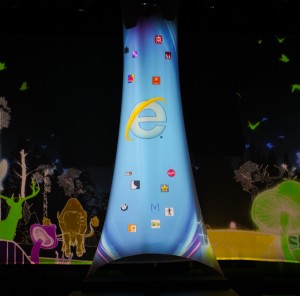 Do I have your attention now?
Do I have your attention now?
Google Chrome's assault on Internet Explorer continued a pace in October, according to browser usage share data that Net Applications released today. Chrome gained share for the 12th consecutive month. Since November 2010, IE share fell 7.72 points, while Chrome gained 8.05. Want to guess from where Google's browser is taking usage share? Hint: It's not Firefox.
Looking more recently, Chrome gained 1.42 points, while Internet Explorer lost 1.76 points September to October. Firefox actually edged up 0.03 points, ending four months of consecutive losses. Apple's Safari eeked up 0.41 points. Usage share for each in October:
- Internet Explorer: 52.63 percent
- Firefox: 22.51 percent
- Chrome: 17.62 percent
- Safari: 5.43 percent
- Opera: 1.56 percent
Internet Explorer usage share fell from 60.35 percent in November 2010; Firefox fell from 23.52 percent; and Chrome rose from 9.57 percent.
Last month, after viewing the startling results of a BetaNews poll, I asked: "My God, does ANYONE use Internet Explorer?" The poll is still open, but out of date, since new Chrome and Firefox versions has since shipped. Among the 4,470 respondents, 40.16 say they use some version of Chrome as their primary web browser. By comparison, 20.88 percent some version of IE, which is less than Firefox (30.18 percent). The poll is unqualified -- meaning we don't know who respondents are -- but we assume more tech-savvy folks based on readership.
BetaNews site browser stats tell a different story, and one that is perhaps more perplexing. Firefox was the top browser used to view the site in October (29.68 percent) followed by Internet Explorer (24.07 percent) and Chrome (23.58 percent). What's surprising is how evenly they are spaced. Safari was 13.57 percent, by the way.
Based on the poll, 70.34 percent of respondents use Chrome or Firefox as their primary web browser. BetaNews browser stats show 53.26 percent of visitors use one of the browsers. Does that invalidate the poll then? Site stats corroborate it, since usage share isn't finite market share. Most people use more than one browser, a tendency supported by BetaNews commenters on this topic and other analyst data.

Judging IE9 Strategy
Browser versions reveal a startling trend that shows the risks Microsoft took with its Internet Explorer 9 strategy. By version, IE8 had highest usage share in October (29 percent), followed by Chrome 14 (13.65 percent) and Firefox 7 (10.18 percent). For most of October, Chrome 14 and Firefox 7 were current versions of both browsers. The data shows how quickly their users are moving to the newest version compared to lag-behind Internet Explorer.
IE9, which had 9.79 percent browser usage share in October, isn't available for Windows XP. Chrome and Firefox are. Microsoft took a look-forward strategy that may pay off as the Windows 7 install base increases, but there's short-term pain today. According to NetApps, Windows XP is still the leading PC operating system, with 48.03 percent share in October. Windows 7: 34.62 percent.
Caveat: According to NetApps, there are 2 billion Internet users, and 93 percent of them use PC browsers. By that reckoning, because not every PC may connect to the Net, the data may not be fully representative of operating system share.
Roger Capriotti, Microsoft Internet Explorer marketing director, presents the data differently. He observes that IE9's usage share on Windows 7 is 34.9 percent, followed by Chrome at 14.3 percent and Firefox at 11.8 percent. "IE9 is growing nicely and is on path to be the leading modern browser on Windows 7 behind IE8 as early as next month".
From security and usability perspectives, Microsoft deserves praise for not making IE9 available for Windows XP. The question now: How quickly can Windows 7 deployments pull forward IE9 usage with it? Can there be enough to overcome Chrome gains? IE usage share was well above 90 percent when Firefox 1.0 shipped 7 years ago next month. Looked at the way, Internet Explorer hemorrhages browser usage share, at a time when Windows 7 adoption should give it more lift. My unsolicited advice: Microsoft must evangelize IE9 and Windows 7 benefits more, and it's high time for some fresh, aggressive marketing.

